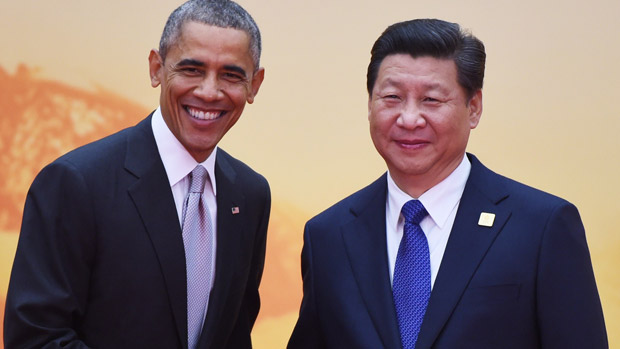China and US strike 'historic' greenhouse gas emissions deal
World's two largest polluters pledge to cap carbon emissions ahead of major climate talks next year

A free daily email with the biggest news stories of the day – and the best features from TheWeek.com
You are now subscribed
Your newsletter sign-up was successful
China, the world's biggest emitter of greenhouse gases, has pledged for the first time to cap its carbon emissions as part of an "historic" deal with US President Barack Obama
The country's leader Xi Jinping has not set a specific target, but said emissions would be reduced by 2030 or earlier. He also set a goal to increase the proportion of non-fossil fuels to 20 per cent of China's energy mix over the next 15 years.
The US has committed to plans to cut its emissions to at least 26 per cent below 2005 levels by 2025, an increase from its previous target of 17 per cent by 2020.
The Week
Escape your echo chamber. Get the facts behind the news, plus analysis from multiple perspectives.

Sign up for The Week's Free Newsletters
From our morning news briefing to a weekly Good News Newsletter, get the best of The Week delivered directly to your inbox.
From our morning news briefing to a weekly Good News Newsletter, get the best of The Week delivered directly to your inbox.
"We have a special responsibility to lead the global effort against climate change," said Obama during a state visit to Beijing. "Today, I am proud we can announce a historic agreement."
But the goals will be "difficult" for the two countries, who together account for about 45 per cent of the world's greenhouse gas emissions, warns the Washington Post.
Obama faces stiff opposition on climate issues from Republicans, while the scale of the construction programme required for China to meet its goals is huge even by Chinese standards.
China must add 800 to 1,000 gigawatts of nuclear, wind, solar and other zero-emission generating capacity by 2030, says the Post, which is "more than all the coal-fired power plants that exist in China today and close to the total electricity generating capacity of the United States".
A free daily email with the biggest news stories of the day – and the best features from TheWeek.com
Martin Patience, BBC Beijing correspondent, notes that Xi has been under growing public pressure to clean up the country's "smog-ridden" cities. "What's debatable is whether the two countries can actually achieve their goals," he says. "But with this announcement both China and the US have brought fresh momentum to the climate change issue.
Commentators say the deal will put pressure on other countries to "follow their lead" and energise negotiations currently underway to set new post-2020 targets when climate negotiators meet in Paris for major global climate talks in December of next year.
-
 The Olympic timekeepers keeping the Games on track
The Olympic timekeepers keeping the Games on trackUnder the Radar Swiss watchmaking giant Omega has been at the finish line of every Olympic Games for nearly 100 years
-
 Will increasing tensions with Iran boil over into war?
Will increasing tensions with Iran boil over into war?Today’s Big Question President Donald Trump has recently been threatening the country
-
 Corruption: The spy sheikh and the president
Corruption: The spy sheikh and the presidentFeature Trump is at the center of another scandal
-
 The fall of the generals: China’s military purge
The fall of the generals: China’s military purgeIn the Spotlight Xi Jinping’s extraordinary removal of senior general proves that no-one is safe from anti-corruption drive that has investigated millions
-
 Epstein files topple law CEO, roil UK government
Epstein files topple law CEO, roil UK governmentSpeed Read Peter Mandelson, Britain’s former ambassador to the US, is caught up in the scandal
-
 Iran and US prepare to meet after skirmishes
Iran and US prepare to meet after skirmishesSpeed Read The incident comes amid heightened tensions in the Middle East
-
 Israel retrieves final hostage’s body from Gaza
Israel retrieves final hostage’s body from GazaSpeed Read The 24-year-old police officer was killed during the initial Hamas attack
-
 China’s Xi targets top general in growing purge
China’s Xi targets top general in growing purgeSpeed Read Zhang Youxia is being investigated over ‘grave violations’ of the law
-
 Panama and Canada are negotiating over a crucial copper mine
Panama and Canada are negotiating over a crucial copper mineIn the Spotlight Panama is set to make a final decision on the mine this summer
-
 Why Greenland’s natural resources are nearly impossible to mine
Why Greenland’s natural resources are nearly impossible to mineThe Explainer The country’s natural landscape makes the task extremely difficult
-
 Iran cuts internet as protests escalate
Iran cuts internet as protests escalateSpeed Reada Government buildings across the country have been set on fire